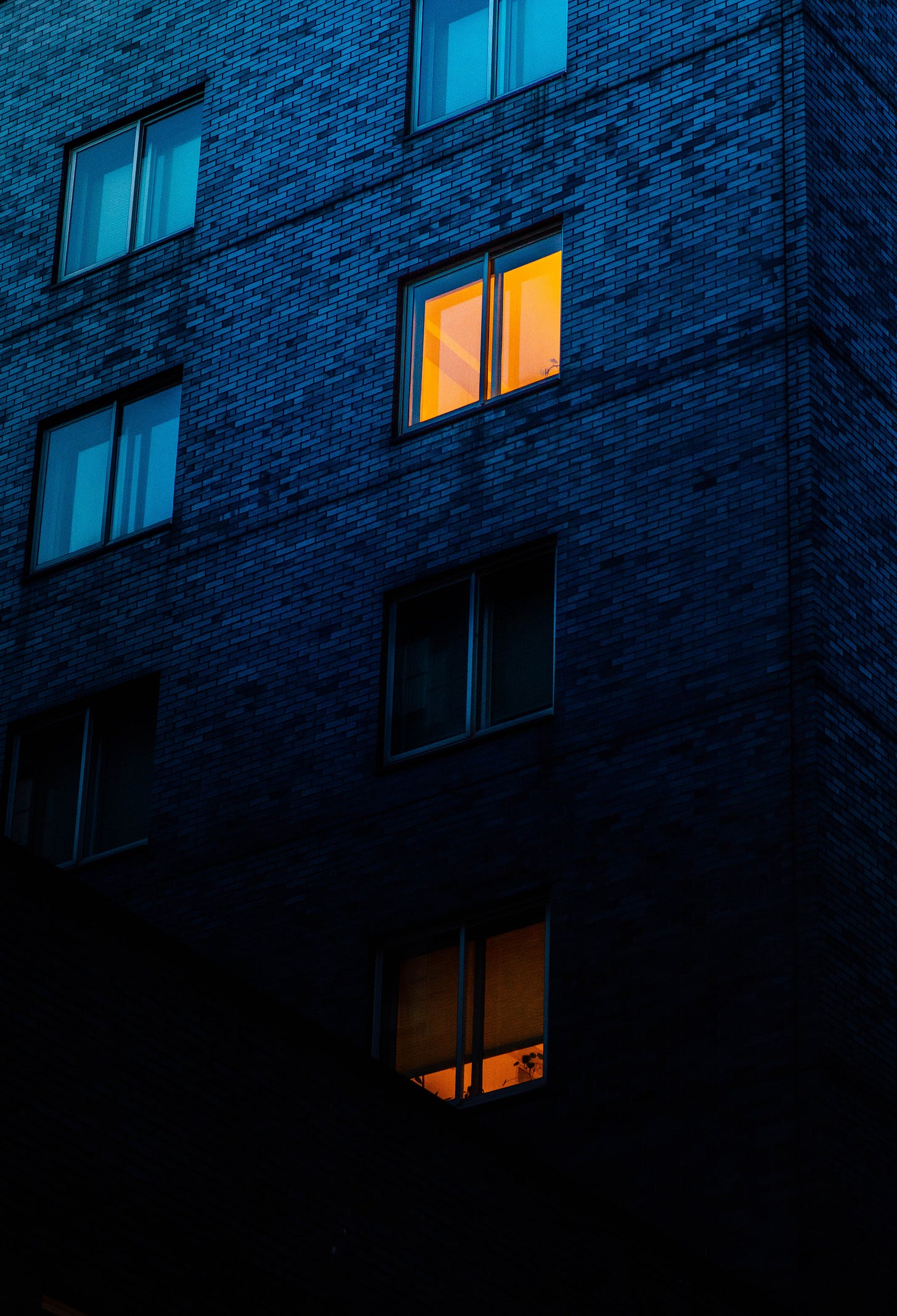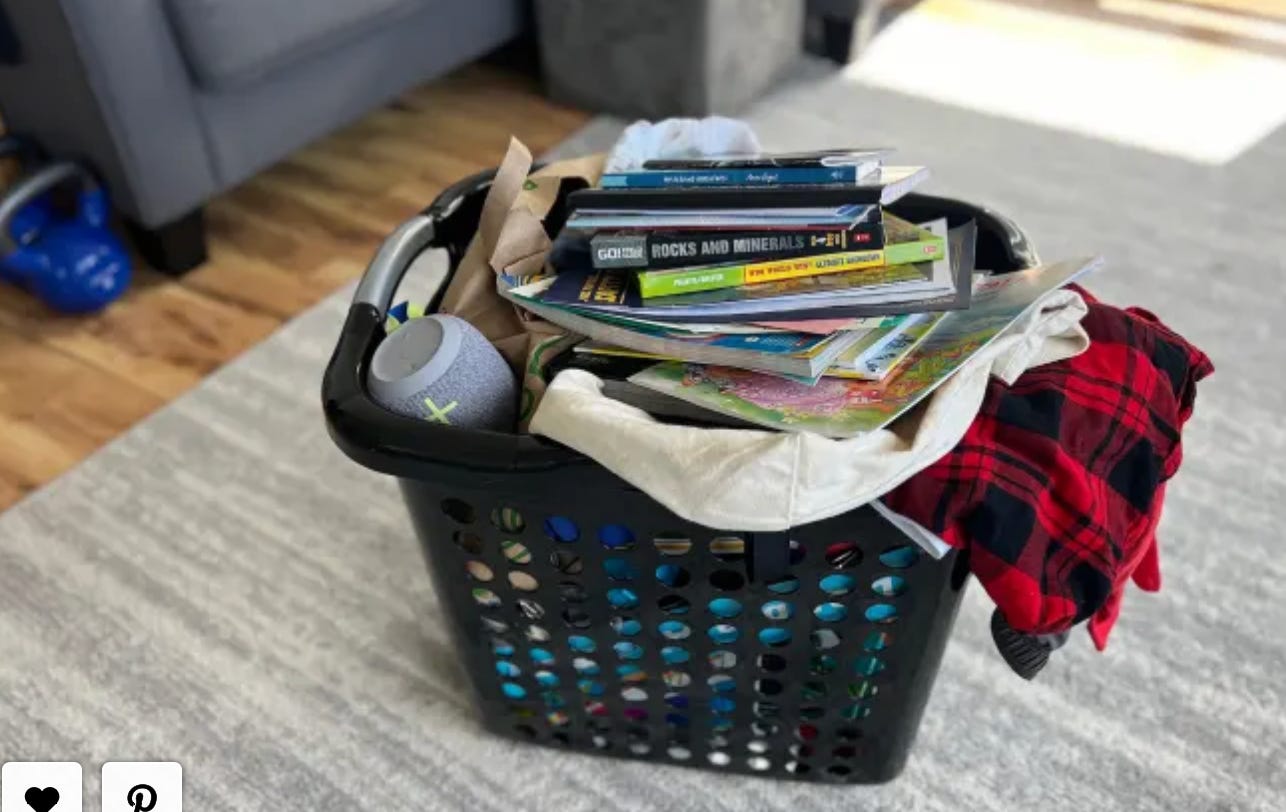The Lectio Letter - Issue #78 - Holding on to Hope
“A prison cell, in which one waits, hopes – and is completely dependent on the fact that the door of freedom has to be opened from the outside, is not a bad picture of Advent”
– Dietrich Bonhoeffer, God is in the Manger
“Optimism and hope are radically different attitudes. Optimism is the expectation that things—the weather, human relationship, the economy, the political situation, and so on—will get better. Hope is trust that God will fulfill God’s promises to us in a way that leads us to true freedom. The optimist speaks about concrete changes in the future. The person of hope lives in the moment with the knowledge and trust that all of life is in good hands.”
– Henri Nouwen
Welcome to Issue #78 of the Lectio Letter. This members-only newsletter is filled with music, film and food suggestions, links, and an article written by yours truly.
This Christmas I’m offering the biggest discount on a paid subscription (50% off) until the new year. You can give a subscription as a gift here for only $27 / £21 which is less than $/£2 a month and helps me continue to buy books for the teaching and training work we do.
Whether you become a paid subscriber or not, I’m very grateful to each of you who read and respond to this newsletter.
The Lectio Letter is a reader-supported publication. To receive new posts and support my work, consider becoming a free or paid subscriber.
PSA: I’ve heard a number of people have been missing out on the whole email if they use Gmail because the email gets ‘clipped’.
You can see at the bottom of the email if it says “message clipped”, then click “View entire message” to see it all.
You are not getting it all if you don’t see my signature at the bottom.Alternatively, if you don’t want to read this in your email, you can use the substack app (where you can listen to the article read out) or read it online at LectioLetter.com
Introduction
This is the season where we sit in the darkness awaiting the light. Advent is a season to sink our lives into waiting of the people of God throughout time in order that Christmas as it arrives ignites fresh hope for our own waiting lives. Christ was, and is and is to come and Advent teaches us how to wait in the time between the comings.
This Issue reflects on the nature of hope throughout the life of faith. It begins in naive faith and grows over time into a hope that we can hold in the midst of the many “not-yet” circumstances that surround our lives.
The next issue will be my yearly review of all the books I’ve read in 2023. If you know of someone you think might enjoy that I’d appreciate you encouraging them to sign up by using the button below…
I hope you enjoy this Lectio article. Feel free to leave a comment or a question after you’ve read it, I love receiving those.
Status Board
Life
As I mentioned in the last lectio, we had a great time wrapping up with the young people in Masiphumelele before most of them head to their ancestral homelands in the eastern cape of South Africa.
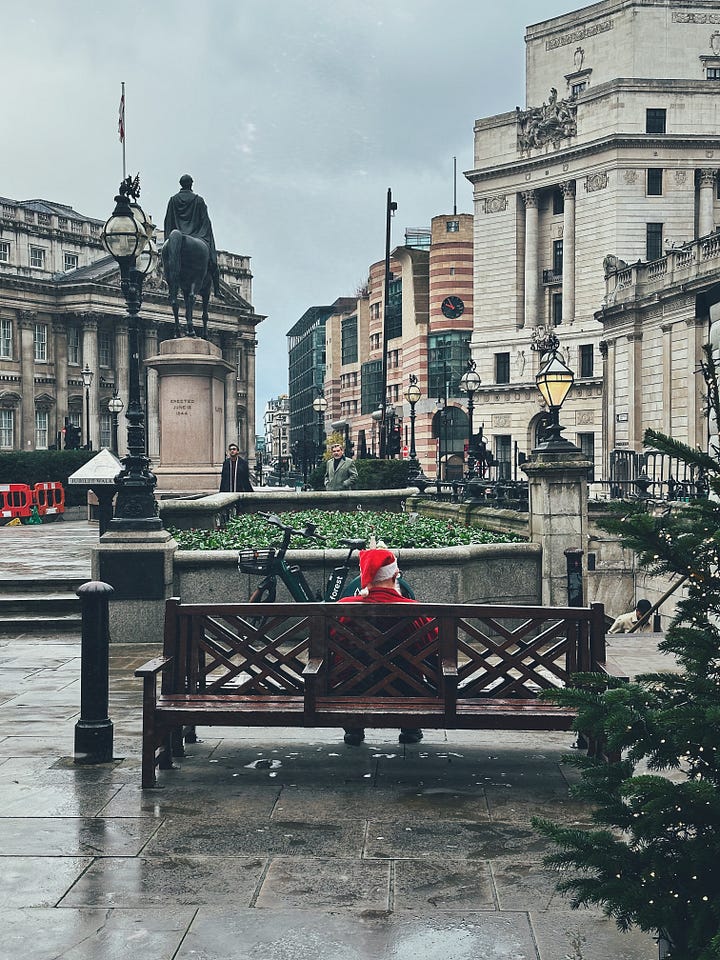
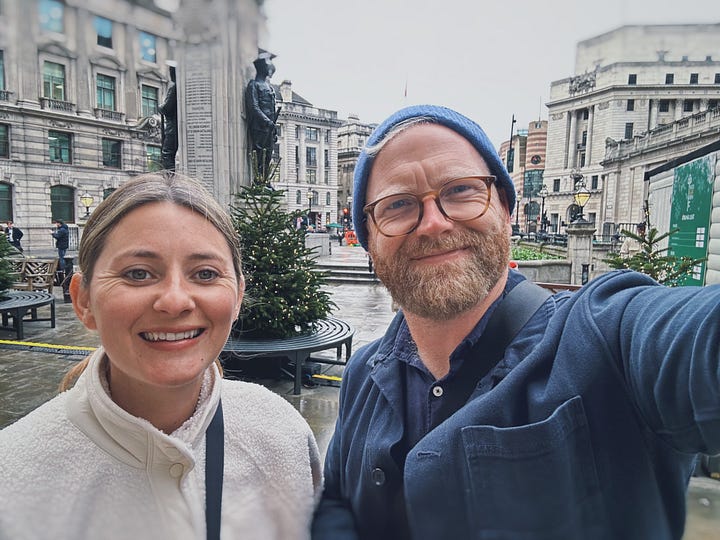
Soon after that, at the last minute someone was able to help us attend our dear friend’s wedding in Dorset. Given that we had guests in Cape Town we made a crazed 5 day dash back to the UK and had the privilege of officiating the ceremony.

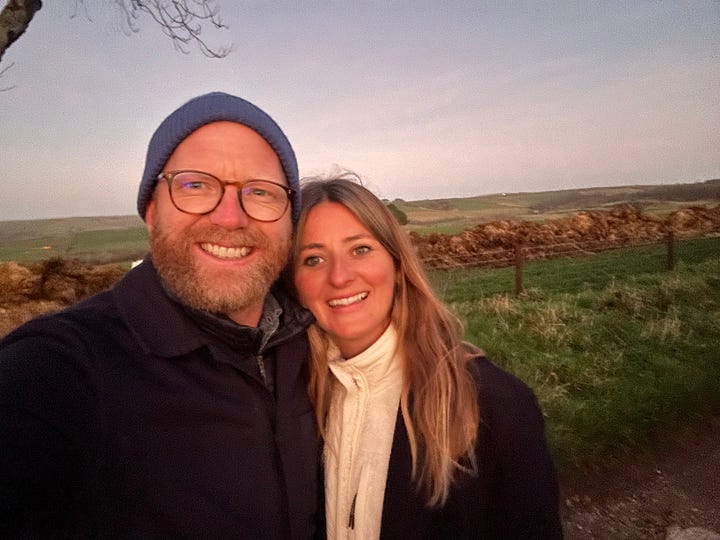
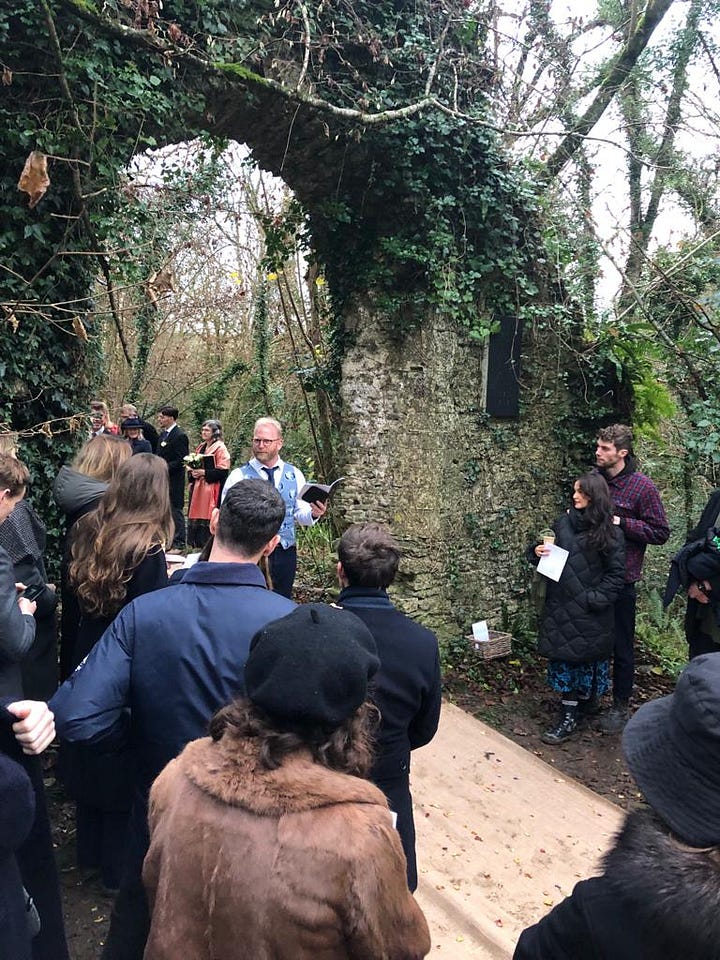
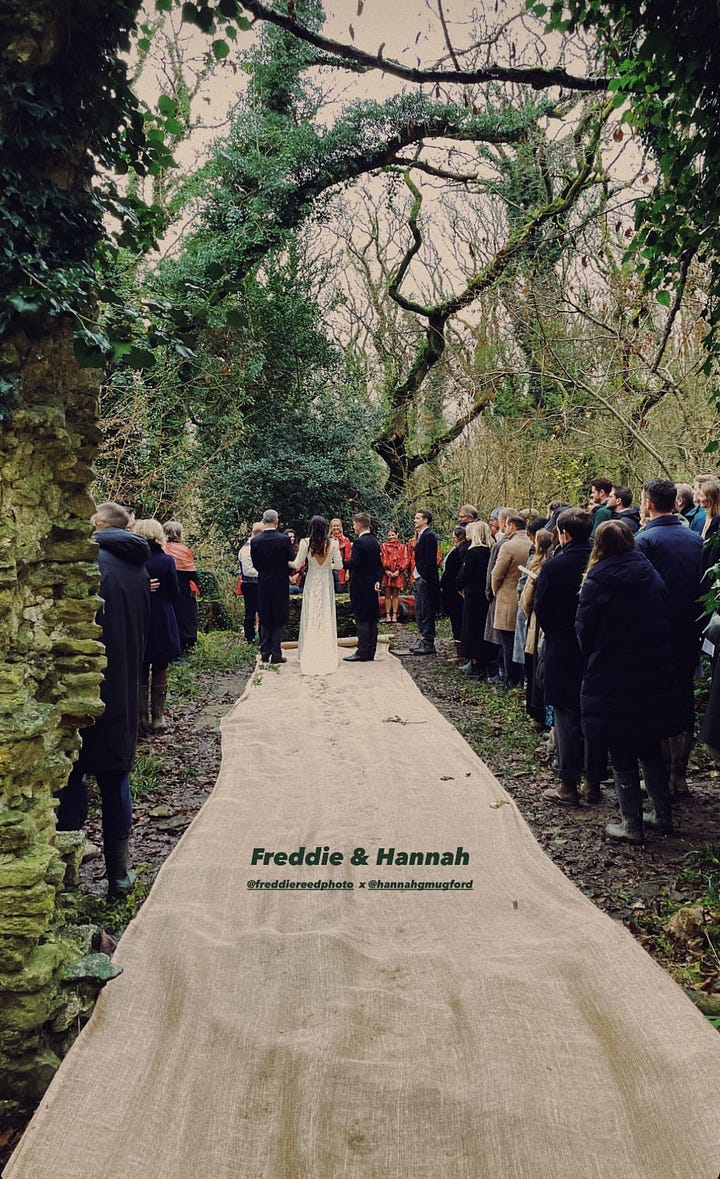
We were also in London, one of our favourite places, for Rachel’s birthday which was a real treat.
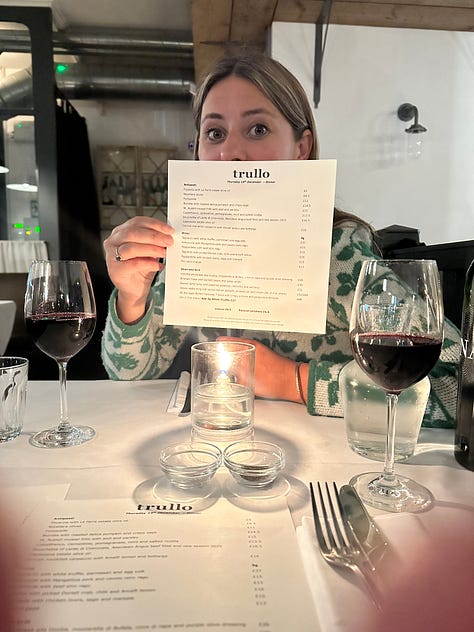
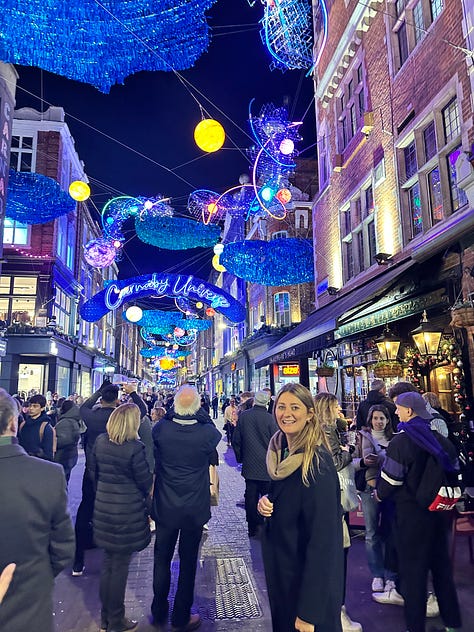

At lunchtime, we went to Notting Hill to visit “Books for Cooks” where the proprietor serves a 3-course set lunch with recipes from books in store for only £9! Sitting on communal tables was a great (and somewhat quirky) experience.


The first few days back here in South Africa, our valley was overwhelmed with the largest wildfire experienced in the last 17 years. We are happy to report this has now subsided and no properties were lost. These fires happen almost yearly and in fact, play an important role in the fynbos here germinating.


Reading
The Burnout Society
Byung Chul Han is a Korean-born german philosopher. This small book is a fascinating perspective on the emergence of burnout, depression and anxiety. Put simply, Han believes that historically we lived in a ‘discipline’ society. We were mastered by the duties and ‘shoulds’ of the surrounding culture. In such a culture, we ‘act out’ in response to the repression of the burden of disciplined “shoulds”. In contrast, we now live in an ‘achievement’ culture, where ‘shoulds’ no longer control our lives, but ‘coulds’. There is now an endless list of achievements we aspire to and so burnout results from the overwhelm that Han describes as “The Fatigue of becoming myself”. It’s an insightful account worth reflecting on.
Radical Orthodoxy
James K.A. Smith of “You are what you love” fame, attempts to explain a niche academic theology trend called “Radical Orthodoxy”. Radical Orthodoxy attempts to build a philosophical basis for a Christian imagination through the non-foundationalism that came through postmodernity. While Radical Orthodoxy doesn’t capitulate to the nihilism and materialism of postmodernity, it picks up the helpful critiques which inhibited modern theology from a vaster account of the activity of God in the world. Radical Orthodoxy does this by returning to a Christian platonic conception of ontology which centres on participation. That is, the created (human and the rest of creation) has its life upheld through its participation in the reality of God’s life. There is much more to be unpacked here, but I can’t imagine too many of you are interested in reading this, so I’ll end here. ;)
Eating
This is what we are eating on Christmas Day
Take about 2.5kg Deboned Leg of lamb and marinate it with 3 sprigs Rosemary, 4 cloves garlic, the zest of 2 lemons and the juice of 3 and 1 and ¼ cups of Olive oil in the refrigerator for 30 hours or more.
Take the lamb out before cooking and allow it to come to room temperature. Pre-heat the oven to 200c and either heat up you largest pain on the stove or better yet get your bbq/braai blue smoke hot. Season the leg with lamb seasoning and vegetable oil and then sear the leg fat down to seal the leg.
Then place the leg fat side up in the oven for about 40 mins.
Allow the leg to rest for 10+ mins after it emerges and then carve it as thinly as you can.
Arrange the slices on a platter, toast pine nuts and pour over chermoula.
To make the chermoula
Take 30g of Coriander,
30g of parsley,
2 cloves of garlic,
2 tbsp lemon juice,
1 tsp cumin,
¼ tsp of paprika,
chilli flakes,
cinnamon,
salt
and
a ¼ cup of olive oil
and pulse it together in a food processor until it forms a paste.
Watching
Last night we watched Maestro, a beautifully shot, incredibly acted, yet haunting biographical film about the life of Leonard Bernstein.
How does Hope mature? | Advent reflections on John the Baptist
As we move through this season of Advent toward Christmas, the Church (throughout the ages) has invited us to focus on those who faithfully waited for the Messiah. This may seem strange because the Messiah has already come in Jesus, and yet He has not yet returned. God has already come and yet not all things have yet been made right. For that, we need to wait for His second coming.
During the Advent season, we rehearse those who waited for millennia for the liberation and renewal of all things, and we remember those who spent their own lives waiting, longing and hoping. This is the waiting Advent seeks to train us in.
The younger we are, the easier it is to have naive hope. The 'magical' anticipation of receiving Christmas gifts in our childhood gets rehearsed in sentimental Christmas adverts which bombard us at this time of year. Many adults focus on their children’s excitement in the run-up to Christmas, trying to catch stray whiffs of their own anticipatory hopes from childhood.
However, a few decades of living is enough for most people's naive hope to be clobbered and bruised by painful blows, and it is here that true hope often retreats into sentimentality. We need Advent to help us remember and learn from those who waited through their own disappointments: Simeon (you can read here), Anna, and John the Baptist. These ancient friends spent their lives longing for the Messiah to come. They sustained hope and embodied faithfulness throughout their lives, and so can we.
Let’s consider John the Baptist’s journey because I believe it has something to teach us about the nature of holding on to hope.
We are told that when Elizabeth meets Mary on the road (Luke 1:41–42), John leaps in invitro recognition of the presence of the Messiah his people have longed for over millennia. Before John has words or even rational thoughts, something within him begins to long. Maybe you too remember the early days of faith and the hope and expectation leaping within you for all you longed for God to do. In his adulthood, John lives a strict life ordered through his ascetic wilderness living and proclaims the coming of the Messiah. When he sees Jesus, his adult cousin, he recognises him not only as another prophet but as the Lamb of God (John 1:29), the one of whom the prophets had spoken.
Similar to John, many of us have spent costly time and energy living our lives wholly devoted to God. We have proclaimed our hopeful expectations, and have seen the first fruits of God's Kingdom while waiting for the next big thing.
But as we fast-forward past John's time in the wilderness, we find him suddenly in jail, and during this time of imprisonment, he sends his disciples to ask Jesus, "Are you the expected one, or do we look for someone else." (Luke 7:19-20)
John's hope and longing has been for God's coming Kingdom. His preaching of repentance has called people to ready themselves for the wholesale transformation of society as the kingdom of God breaks in. And now we find him in the loneliness of a cell whose door has been locked by those he has been preaching against, and he is beginning to doubt. Is this new Kingdom really imminent, or is his hope misplaced?
Maybe this is where you find yourself this year as you journey toward Christmas? You may have previously set all your hope on what you imagine God's kingdom might look like when it came, intermingled with mixed notions of widespread and longed-for change. Like John, you wanted to be counted as a herald to the Good News, and now you find yourself in a cell of doubt and shattered hopes. The reality is, many of our naive hopes come to an early end when we face the brutality of the world as it is and not as we hoped for it to be.
But something is happening with John's faith, his hope and his expectation (and ours) when he is sitting, doubting, in his cell. He is in the process of being transformed, and so are we.
Writers on the spiritual life speak about the early naivety of faith. They don't discount or discourage it for it is the only way faith can begin. They also recognise that the conditions of the world are like an acid to this hope, and this form of hope inevitably fades. We experience some of the same darkness and hopelessness that the rest of the world experiences, and wonder if our earlier hopes were just a mirage.
But for those who sustain their devotion in the midst of this cell of hopelessness and doubt, a gift begins to emerge. This gift from God is what writers have called a second naivety, and it is a resurrected hope, more humble and rooted than the first.
In the second naivety, our earlier hopes are now transfigured. They become more true and deep than our first hope, and are able to be held alongside the seeming incoherence of pain and suffering.
Our second naivety is hope-refined. It is a resurrected faith. This faith is not stirred by human effort and enthusiasm alone, but is a faith gifted through faithful longing. It can stand in defiance against the ongoing presence of pain and suffering that surrounds us, even though we are unable to fully explain it.
In Luke 7, Jesus instructs John’s disciples to:
“Go and tell John what you have seen and heard: the blind receive their sight, the lame walk, lepers are cleansed, and the deaf hear, the dead are raised up, the poor have good news preached to them."
Jesus is doing more than telling John that supernatural signs are happening, which is what impresses us in the West. There were many workers of supernatural signs in the ancient world, just as there are in the global south to this day. Rather, the signs Jesus is performing are signposts to the renewed way of being human, and the beginning of the restoration God always intended.
So often our own hopes for God's kingdom are set on grand visions of change. However God, in Jesus, heals individuals before the healing of vast political systems. Renewing humanity is the only way larger world systems will be changed.
It is understandable that John, languishing in prison, is looking for a more dramatic and immediate transformation given his own cell-bound circumstances. This has been my experience, as it has been for many transversing their “middle years. Our first naive faith gets trampled on by the pain and disappointment of life. Things didn't change as quickly as we hoped for, and the things we wanted changed didn’t seem to be impacted at all.
And yet, Jesus’ first coming reveals something about the nature of his Kingdom. It is bottom-up, not top-down. This Kingdom comes to those in need, not to those in comfort. Jesus' first coming ignited hope which then seemed lost when he didn't overthrow the Roman occupation of his homeland. But he wasn’t here to overthrow the Roman government. Rather, he set about redeeming and renewing those in need.
As we journey through this Christmas season, Jesus is inviting us to reflect again on those friends from the past who waited in the darkness for a great light, a light which didn't fulfil the expectations of his earliest followers and has most likely not fulfilled yours either.
Yet Jesus tells the disciples of John to look at what the power of God is doing in redeeming people’s lives. It may not always be grand, multipliable or loud, but a new humanity is being restored, one blind, deaf, lame heart at a time.
Jesus gives a difficult word to his soon-to-be-executed cousin in jail:
"Blessed is the one who is not offended by me."
When people disappoint our deepest held expectations, what else is there but to be offended? But Jesus tells John, through his disciples, to look at what God was doing rather than what he had expected and hoped for. We are invited to do the same.
The challenge of a spiritual life is to traverse the pain of the broken world without being offended by the things God is seemingly not doing. During the Advent season, we rehearse these longings and hold onto a deeper hope, a second naivety.
This second naivety not only restores our first hope, it transforms what we hope for. Rather than reducing our expectations, it reforms them. Our blindness to what God is doing is healed along with our deafness to his humble but overcoming word, and we receive new hope.
The One who has come in humility will return in power, and our present longing no longer pretends that darkness doesn't exist but holds on for the light that was, and is, and is to come.
Miscellaneous Links
The Pile Method for cleaning up!
To use the “pile method” to declutter a room, start by gathering everything that’s not in its place into a basket. Then, dump it all in the living room, start sorting, and then put items away.
100 Little Ideas
A list of ideas from Morgan Housel, in no particular order and from different fields, that help explain how the world works, here were some of the insightful ones I hadn’t heard of before;
Skill Compensation: People who are exceptionally good at one thing tend to be exceptionally poor at another.
Three Men Make a Tiger: People will believe anything if enough people tell them it’s true. It comes from a Chinese proverb that if one person tells you there’s a tiger roaming around your neighborhood, you can assume they’re lying. If two people tell you, you begin to wonder. If three say it’s true, you’re convinced there’s a tiger in your neighborhood and you panic.
Boomerang Effect: Trying to persuade someone to do one thing can make them more likely to do the opposite, because the act of persuasion can feel like someone stealing your freedom and doing the opposite makes you feel like you’re taking your freedom back.
The 90-9-1 Rule: In social media networks, 90% of users just read content, 9% of users contribute a little content, and 1% of users contribute almost all the content. Gives a false impression of what ideas are popular or “average.”
Cobra Effect: Attempting to solve a problem makes that problem worse. Comes from an Indian story about a city infested with snakes offering a bounty for every dead cobra, which caused entrepreneurs to start breeding cobras for slaughter.
Second Half of the Chessboard: Put one grain of rice on the first chessboard square, two on the next, four on the next, then eight, then sixteen, etc, doubling the amount of rice on each square. When you’ve covered half the chessboard’s squares you’re dealing with an amount of rice that can fit in your lap; in the second half you quickly get to a pile that will consume an entire city. That’s how compounding works: slowly, then ferociously.
The Clamp and the Mallet by Seth Godin
While building a project, I found that a key part was stuck.
I tapped it with a mallet, then harder, and eventually whacked at it. No luck.
Then I got smart and put three clamps around the part, gently turning each one, increasing the pressure, until it simply popped out.
Persistent, gentle pressure almost always outperforms sudden, violent blows.
Long exposures of planes taking off at night by Modern Notoreity on Instagram




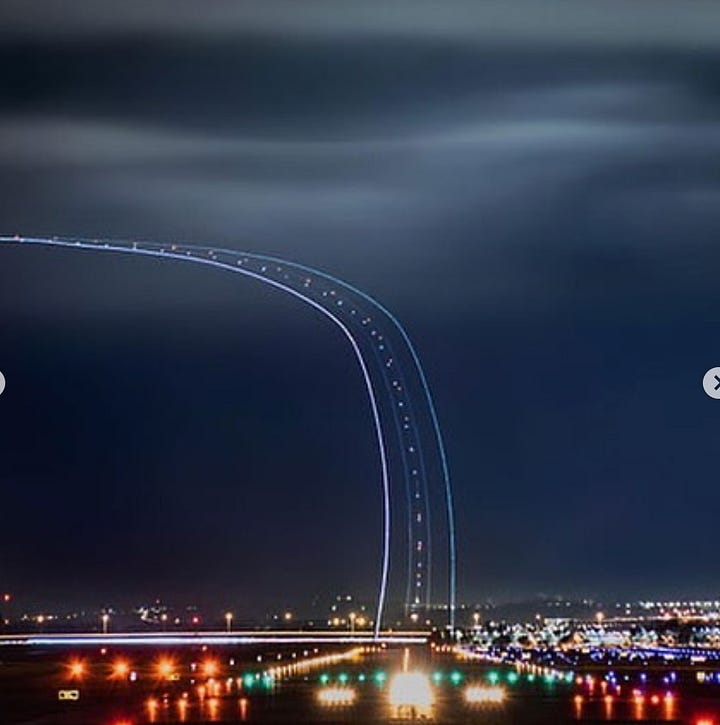
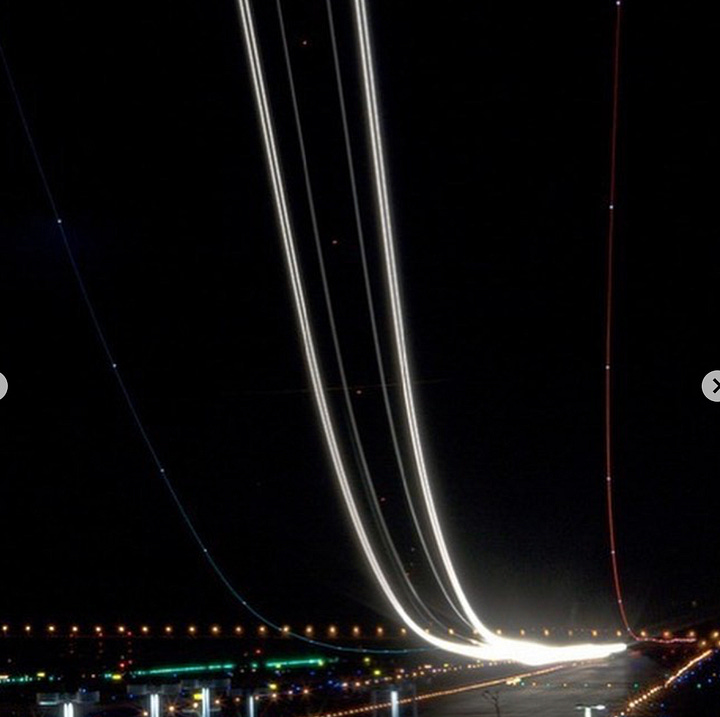

If you enjoyed this newsletter, have a question, or suggestion, feel free to leave a comment;
Finally, if you think someone else would be interested and enjoy this, please do share it with them, maybe even consider giving a gift subscription for 50% until the New Year.
That’s all for now…






